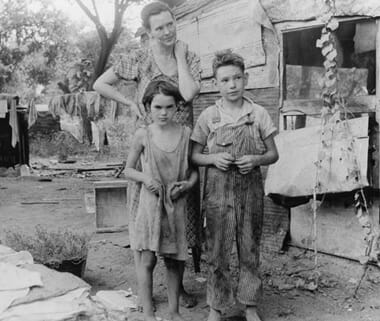I am a child of a child of the Great Depression and what I know of it rests in bits and pieces of largely unheeded conversations between my mother and grandmother. With the economic future that very possibly looms ahead, there are times I often wish I had paid more attention. The Great Depression, followed closely by World War II, was a global event that impacted people of every economic, social, and racial stratum. 35% unemployment, worthless money, the dust bowl of the Midwest, and looming global instability in the 1930s served to create a perfect storm that tested the very soul of our nation.
The people who survived that period turned “Make Do” into a proud moniker rather a term of derision. My mother was born eight years before the Great Depression and has never forgotten what it was like. To this day, at 86, she is still a hoarder, saving every scrap of paper and bread bag in case another rainy day arrives. My grandmother used to tell stories of their community rabbit farm shared among neighbors of downtown Jackson, Mississippi. Rabbit food came in the form of grass clippings left by street workers, while rabbit manure served to fertilize garden patches grown in the median of the street in front of their house. People learned quickly to substitute what they had for what they wished they had.
If you want to learn more about life in the Great Depression and the ways people learned to “make do,” order a copy of We Had Everything But Money: Priceless Memories of the Great Depression [1] from Gramercy Press. Gramercy has done us all a favor by keeping alive memories that are fading away for all but a few. Here are a few remembrances of how people coped with the shortages of life during that era.
“For school lunches, my mother would make my favorite: dandelion sandwiches on fresh baked bread. After the dandelions had been cleaned and boiled, she’d squeeze out the juice and fry the greens in olive oil, seasonings, salt and hot red pepper. We saved the juice, too, and drank it like hot soup with a dash of olive oil and salt.”
“The first day we’d have beans. The second day Mother would add water and elbow macaroni to the leftovers. The next day she’d add a can of tomatoes. If there were any left after that, she’d add more water and drop dumplings into it. Seems like we ate beans all week, but they were filling and helped us survive the Depression!”
“WE OFTEN made a meal of sliced raw potatoes, onion and, on occasion, a few strips of bacon. We added some water and cooked everything together in a covered pot. It was really good. In fact, we still make “Depression soup” today!”
“Parents learned tricks that cut the food bill. You parked outside the grocery until 10 minutes before closing time on Saturday night and then hurried in to snap up bargains on fresh produce. It was priced for quick sale because it wouldn’t keep over Sunday in those unrefrigerated times. I remember Dad buying an entire sack of bananas for 10 [cents]. We feasted on them for nearly a week.”
Close on the heels of the Great Depression, and perhaps only being ended by it, came World War II. During the Depression there was a shortage of both goods and money to buy goods. During the War the goods and money were returning, but now the goods were needed for a higher cause—to feed, clothe and arm our soldiers as they fought to defend our liberty. Many daily staples were rationed to the point it seemed as though they almost disappeared. Among the goods severely rationed between 1942 and 1947 were sugar, coffee, processed food, meat, canned fish, cheese, canned milk, and fats.
Once again Americans learned ways to “make do”. Every substance imaginable was used as a substitute for coffee, including ground acorns. Though confined to south Louisiana before the war, chicory came to be widely used a way to make a little coffee go a long ways. Sugar was replaced with honey, molasses, and corn sweeteners when available. Many people used cottage cheese as a replacement for meat. In fact, the sale of cottage cheese grew 500% in a four-year period. Necessity also forced industry to step in and produce substitutes like oleo for butter. When people ran out of substitutes, they simply grew their own. Victory Gardens, often grown as cooperatives among several families, provided much needed healthy food. By 1945, 40% of American vegetables were being grown in an estimated 20 million victory gardens.
Urban dwellers were far more harshly affected by the Great Depression than people in rural areas, simply because they were totally unprepared to provide the basics of life for themselves. But everyone had to learn to replace what they were used to with what got them by, and they were better for it. There is a reason my parents are part of what has been called “The Last Great Generation.” Unfortunately, the very struggles they endured also led many to do everything in their power to make sure we baby boomers never had to suffer like they did. As a result, my generation grew soft again, and our children even more so.
Now we face a looming storm once more. Yes, there are wars and conflicts on many fronts, but they are but nuisances compared to what will happen should we face another global economic collapse. It would do all of us well to purchase a copy of We Had Everything but Money [1] and educate ourselves on how to be Depression Era survivors. The need for it may come sooner than any of us care to imagine.
If you liked this article you may be interested in this product from our sponsor.
 [2]
[2]
